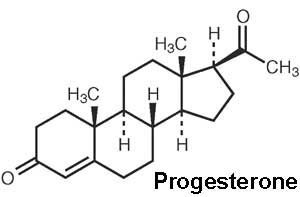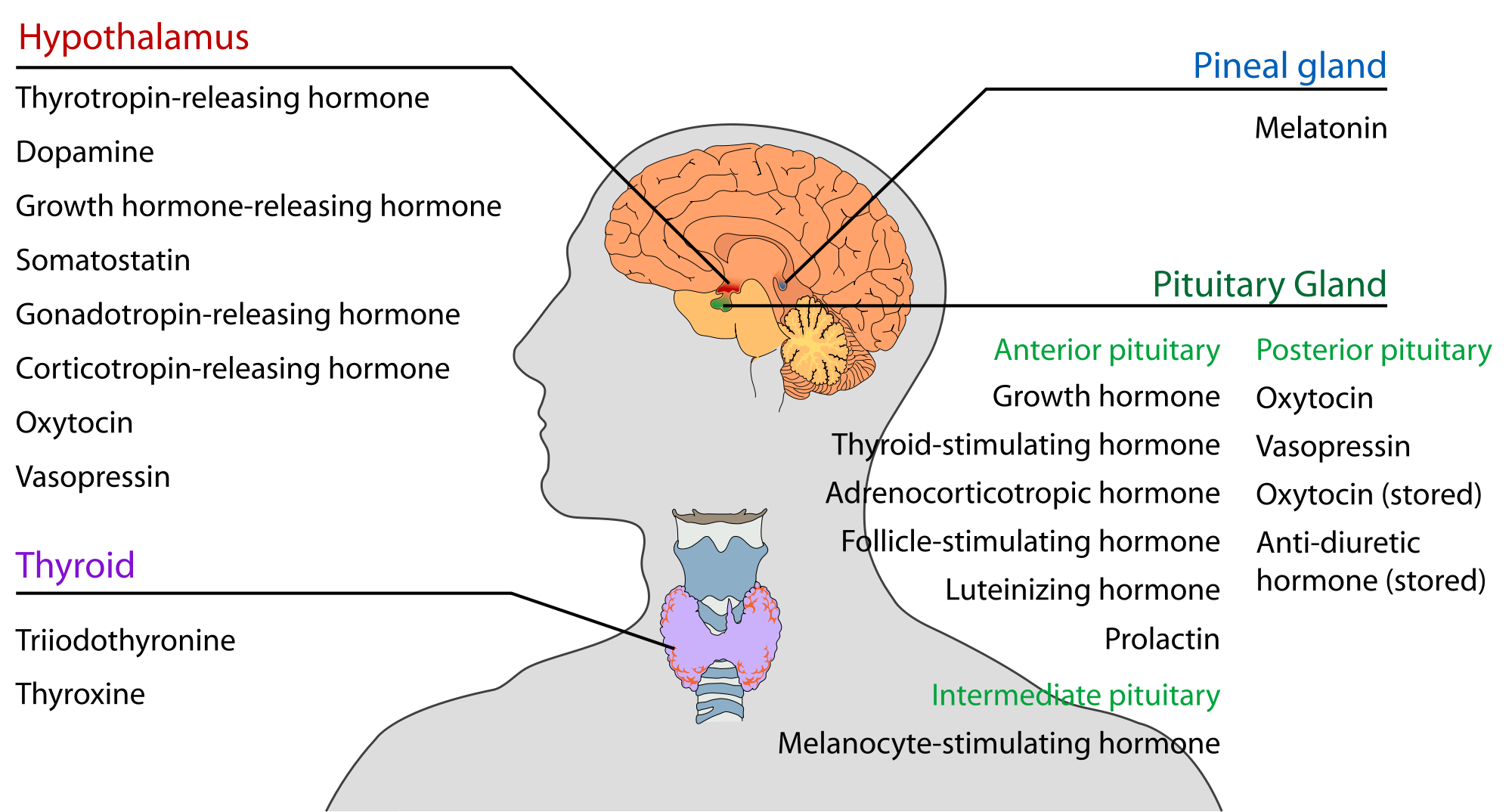We have talked about sleep hormones all over our blog to emphasize their importance. We have also talked about certain specific hormones in order to explain whichever disorder or condition we are talking about, whether it be sleep deprivation or insomnia or sleep apnea, etc. It is because sleep is regulated by some specific hormones. Sleep can also be disturbed by other hormones.
This time, let’s see which hormones help regulate our sleep and how they exactly work, scientifically wise.
Melatonin

Image courtesy: www.wikipedia.org
Melatonin is a hormone produced by the pineal gland. It is an organ that exists in both human and animal bodies. The role of melatonin is to regulate sleep as well as ensure a balance between sleep and wakefulness.
And not just by animals and humans, but melatonin is produced by within plants as well. But unlike us humans, plants use melatonin mainly to defend themselves against oxidative stress, which is a condition existing in all living beings where not enough anti-oxidants are produced, resulting in cells damage – especially mitochondria and DNA.
When it comes to animals – and this is where it gets interesting – melatonin helps synchronizing the circadian cycles. In other words, melatonin is necessary for the regulation of blood pressure, typically during sleep, and the control of the amount of sleep needed.
Like for many other hormones, melatonin’s effects are activated through receptors for melatonin.
This shows that melatonin is needed if you wish for a proper night of sleep. And luckily, you can find it as a pill in any nearby pharmacy. However, even if it is used to treat insomnia, it still hasn’t been scientifically proved to be efficient against sleeping disorders.
Cortisol
Cortisol is said to be a diurnal hormone, meaning it’s a hormone mainly active in daytime. Its amount in the blood vary through the day. At the beginning of the day, around 7 or 8 am, the levels of cortisol are at their peak. And the more time passes, the lower cortisol levels get in

Image courtesy: www.wikipedia.org
the blood. At the end of the day, around midnight, the levels are at their lowest.
Logically, this means that high levels of cortisol keep you awake (throughout the day), whereas low levels of cortisol help you fall asleep.
So you want to make sure your cortisol levels are high to get the energy you need, except for when you want to sleep. In that case, you want for your cortisol levels to be at their lowest so that you don’t have excess of energies that would keep you awake.
The problem is when your cortisol levels aren’t low enough for you to fall asleep at night. That is when you know something is wrong. And that is also one of the reasons you might be dealing with insomnia, or any other sleeping disorder. The principal reason your cortisol levels stay high is obviously stress. Under any form of stress, your mind goes into it’s fight-or-flight mode, which keeps your whole body alert through the increase of the production of many hormones such as adrenaline and of course cortisol. And that is how you lose your ability to fall asleep and have pleasant dreams.
If you don’t learn how to deal with the regulation of your cortisol levels – in particular through managing your stress, then you may face some serious issues.
But worry not, here is a list of all the little things you can do that can tremendously impact your sleeping habits, and effectively help reducing stress and thus cortisol levels in your blood at night.
Tips to lower cortisol levels
- Have a bedtime routine consisting of habits you reproduce every single day until your mind starts pairing them up with sleep. You may want to drink a hot cup of tea or any other beverage at a specific hour before bed everyday, or you may want to meditate on a daily basis right before going to sleep. Hot showers before bed can also be a good way to relax your body and mind and get them ready for sleep. Some people also like to read, write or draw before bed in order to empty their minds and rest their bodies before getting into bed.
- Try essential oils. Those are highly effective to make your mind buzzy before you get into bed, and help soothe out any anxiety symptoms that may be hindering your sleep. The lavender essential oil is by far the most popular one used against stress, as well as the most effective. You can simply put some drops on your pillow and sheets, or even in your bath – why not. And if you are in fancier stuff, you can always invest in a diffuser. In combination with this, you may want to see if using products such as bulk cbd gummies can be beneficial for stress-free sleep, as the mix of inhaling calming oils and consuming relaxing foods may be best for your overall experience.
- One other good way you probably haven’t thought about would be the use of adjustable beds. We have talked plenty of times about adjustable beds on our website, as they proved themselves to be highly effective against sleeping disorders such as insomnia or sleep deprivation. Laying down on your adjustable bed to enjoy a good book before going to sleep is a positive way to de-stress and thus lower your cortisol levels to be able to sleep.
- Being too nervous with anxiety is also a cause of stress. You can calm your nerves by using a vagus nerve stimulation device. Of course, consult your physician before using such regulator devices.
Related Articles: Food to avoid before sleep
Female hormones

Image courtesy: www.wikipedia.org
It is impossible to talk about hormones regulating sleep and not talk about reproductive hormones.
When it comes to women’s hormones, these happen to have an immense impact on the sleep-wake cycle. Their effects especially depend on the menstrual cycle.
Right before getting their periods, women tend to have issues with the control of their body’s temperature, which leads to a disturbed sleep. That is actually mainly caused by the sudden drop of progesterone levels in the blood; progesterone being one of the main female hormones.
In the case of women suffering from the PMS (premenstrual syndrome), melatonin levels get messed up, which is why most of those women tend to experience daytime exhaustion and sleepiness, yet have troubles with sleeping at night.
When a woman is pregnant, her hormone levels change dramatically as well. The levels of progesterone in the blood spike up, causing daytime sleepiness and insomnia.The levels of estrogen – the other main female hormone – increase as well, leading to snoring as the muscles of the throat area get swollen.
Finally, when a woman reaches her menopause, her estrogen levels drop largely, thus disturbing the sleeping patterns and the sleeping cycle. The loss of estrogen can also cause further snoring or even sleep apnea. As progesterone levels get messy as well, the control of body temperature is lost, and the increase in the levels of adrenaline may both lead to sleeplessness and fitful sleep.
Male hormones

Image courtesy: www.wikipedia.org
When it comes to men’s hormones, testosterone is the first to come to mind. In the case of testosterone, its levels are at their peak during sleep. It has been noticed that when a man suffers physical problems, from sleep deprivation, or simply when he ages, his levels of testosterone drop, thus leading to a perturbation of sleep patterns and the sleep cycle, as well as to a deterioration of the quality of sleep.
Surprisingly enough, it is possible to take testosterone as a pill to improve the quality of sleep for men, but it shouldn’t be taken too much or else one may have to deal with other sleep issues.


Magnificent post on sleep hormones. I’ve been having some troubles falling asleep and may be this knowledge on sleep hormones will help me fix my insomnia!